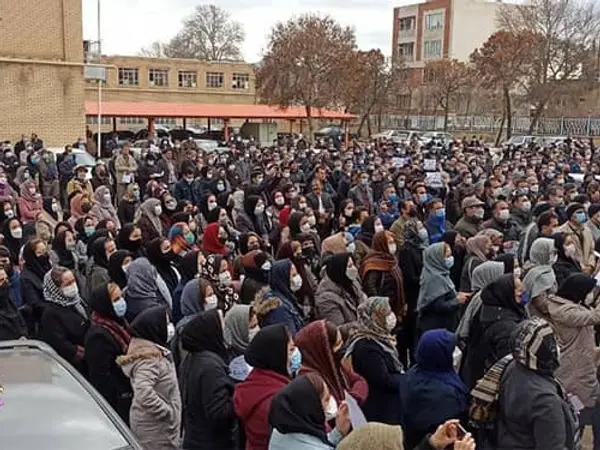Politicians on both ends of Iran's political spectrum continue to express concern over the dire state of country’s economy and the risk of a social explosion.
Increasing criticism of regime insiders coincides with the anniversary of the Islamic revolution; a time when officials glorify the 1979 revolution and its "achievements," as Supreme Leader Khamenei did in a speech on Tuesday.
Seyyed Reza Akrami, a cleric who has been a member of the Iranian parliament for 20 years told the semi-official news agency ISNA that "prices have broken loose and nobody in the government is accountable" for the ongoing economic crisis.
Akrami criticized the government for its dependency on oil revenues while also lashing out at politicians who do nothing other than trying "to claim their own share of the country's budget."
He opined that the coronavirus pandemic, US sanctions and the situation in the region have contributed to the country's worst economic crisis. The impact of sanctions and the pandemic are known to everyone, but by "regional situation" Akrami probably meant the money Iran is spending on its regional ambitions in proxy wars in Iraq, Syria and Yemen.
Akrami called on the government to behave realistically and pragmatically amid the economic crisis and to move away from "ideals and ideologies" and accept the realities on the ground. He advised lawmakers not to engage in wishful thinking, stop chanting slogans and see the realities.
Akrami also called for the merger of high maintenance religious organizations such as the Islamic Propagation Organization, the Propaganda Office of the Seminary and the Arts Center of the Islamic Propagation Organization as they all do the same thing and duplicate each other's efforts.
Warning of a social explosion
Meanwhile, Massoud Pezeshkina, a left-of-center lawmaker from Tabriz said the people's financial status and purchasing power are declining on a daily basis, and the Iranian society is on the verge of an explosion.
Pezeshkian said: "More than 40 years after the Islamic revolution we still have problems in supplying drinking water, building roads, taking care of the villagers, and creating jobs. This means that we have made mistakes along this long road." He attributed part of the problem to not having a roadmap.
Pezeshkian’s remarks comes while the Islamic Republic boasts about its five-year development plans and Supreme Leader Khamenei's vision for the next 40 years.
Meanwhile, the lawmaker said that Iran cannot fight all other countries. He criticized the opponents of a nuclear agreement, and said, "You cannot improve the people's livelihood by tearing up the nuclear deal."
During the past week, many observers and politicians have warned officials about the critical situation of the economy. Economist Hashem Pesaran argued that the population is likely to turn into a bipolar society in which the affluent class and the underprivileged people will have to face each other in a fierce confrontation.
"A conflict will certainly take place and that is very dangerous. The former will be blinded by pride and the latter by grudge. The angry poor people will be looking for an opportunity to attack and take revenge. In a tsunami, everyone will sink no matter how big their ship is," Pesaran warned.
Meanwhile, sociologist Taghi Azad Armaki recently warned that as the economic crises worsens, the underprivileged class prepares itself for the final confrontation with the political-economic elite.
